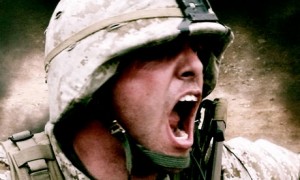 For the families of Haditha, this is a matter of honour
For the families of Haditha, this is a matter of honour
By Nick Broomfield, Friday 13 January 2012 16.30 EST
…
It was more than six years ago, but the massacre that took place at Haditha, western Iraq, in November 2005, still resonates in the Middle East. The now notorious war crime, which left 24 Iraqis dead, became one of the defining atrocities of the war, and the taste remains all the more bitter for survivors – some of whom are children who lost parents in the attack – with the knowledge that not a single US marine has been brought to justice.
The soldier who led his unit into the houses of innocent civilians and shot to kill, Staff Sergeant Frank Wuterich, has been giving evidence in court in the US this week. The trail takes place against a backdrop of failed prosecutions, bartered immunities and botched investigations. Yet the need for a conviction and the acceptance of wrongdoing at the hands of American troops remains of the utmost importance if the US is ever to lay claim to the idea it has a determination to uphold the rule of law.
Following an IED explosion inside the city that killed Lance Corporal Miguel Terrazas and injured two other marines of 3/1 Kilo Company, the rest of the unit went on a rampage under the leadership of Wuterich. A taxi driver and his passengers were ordered out of the car and shot dead, nearby houses were subsequently raided, sprayed indiscriminately with bullets and hand grenades.Among the dead were a large number women and children. What followed was an attempted cover-up, with press releases describing the civilian casualties as a result of the initial bombing . It wasn’t until probing by Iraqi human rights investigators and US journalists that the truth began to emerge. This was Bush’s My Lai, or, as Pennsylvania congressman John Murtha later put it: “cold blooded murder”.
My film, Battle for Haditha, which recreated the incident in all its brutality, split critics along political lines and drew cries of “unpatriotic” at a screening in front of marines in Los Angeles. Eight of those charged had their charges dropped and one was acquitted, leaving just Wuterich to stand.
But if there was any doubt that the killings that day could be classed as anything other than war crimes, a number of incriminating documents have come to light in the past few weeks that place guilt beyond doubt. Some 400 pages from the military interrogation of the offending troops, which should have been destroyed as the Americans left Iraq last year, were uncovered by a New York Times reporter at a junkyard in Baghdad. One statement from a marine says Wuterich told his men to “shoot first and ask questions later”, another witness recalls seeing Wuterich and other marines telling occupants of the taxi to kneel down before spraying them with bullets, . One statement from soldier Steven Tatum, who has already been granted immunity, shows he changed his recollection of the day to admit he knew he was firing upon children at the time. Also recovered are the failed polygraph results of Sergeant Sanick Dela Cruz, who responded “no” on both counts when asked if he shot men at close range and kneeling down, and who later confessed he was told by Wuterich to lie about what happened that day.
Of course we should be wary of only blaming the foot soldiers. We should question the rules of engagement they were operating under and understand that many of those involved that day had previously served in Fallujah, where indiscriminate killing was carried out without reproach.
When researching the film I interviewed a number of troops from Kilo Company, none of whom are implicated in the crime but who arrived at the scene shortly after. Their mentality is difficult to put into words. Anyone who has seen Francis Ford Coppola’s Vietnam war epic Apocalypse Now might have a flavour of it. It’s a thought process that justifies wanton, crazed killing, that demands a high five when a fellow soldier announces they’ve killed an innocent child. A completely different value system, and one that’s distinct from any I’ve seen before. This video of marines shown urinating over corpses in Afghanistan which come to light this week and has drawn widespread rebuke has a sick similarity to Dela Cruz’s admission that: “I pissed on one of the dead Iraqi male occupants of the white car [during the massacre] … I remember that I pissed inside the head of the dead Iraqi, the one with half of his head blown off.”
Not a single marine I interviewed was able to survive after their tour without a tranquilliser prescription. One who photographed the massacre after it happened simply lost the plot and, after tanking himself up on alcohol, drove a truck into a neighbouring house. All of them were hell-bent on returning to Iraq, where the chaotic way of life appeased their mindset. It’s worth remembering that most were just teenagers when they joined the force.
The Iraqi families who turned down the insulting offer of $2,500 in compensation for each family member killed are still waiting to see justice done. As do we all, and to see if the hypocrisy of the Bush era, with its willful disregard for the Geneva conventions, the rule of law, and every other yardstick of a civilised democracy, will continue under the Obama administration. Several of us have been trying to organise a victims’ fund for the Haditha family survivors, but their greatest concern is to see justice done. It’s a matter of honour.
…
http://www.guardian.co.uk/commentisfree/2012/jan/13/bush-my-lai-haditha-massacre-fund or http://bit.ly/AgFdcu
Photograph: Channel 4 (from Guardian article re-posted here).
